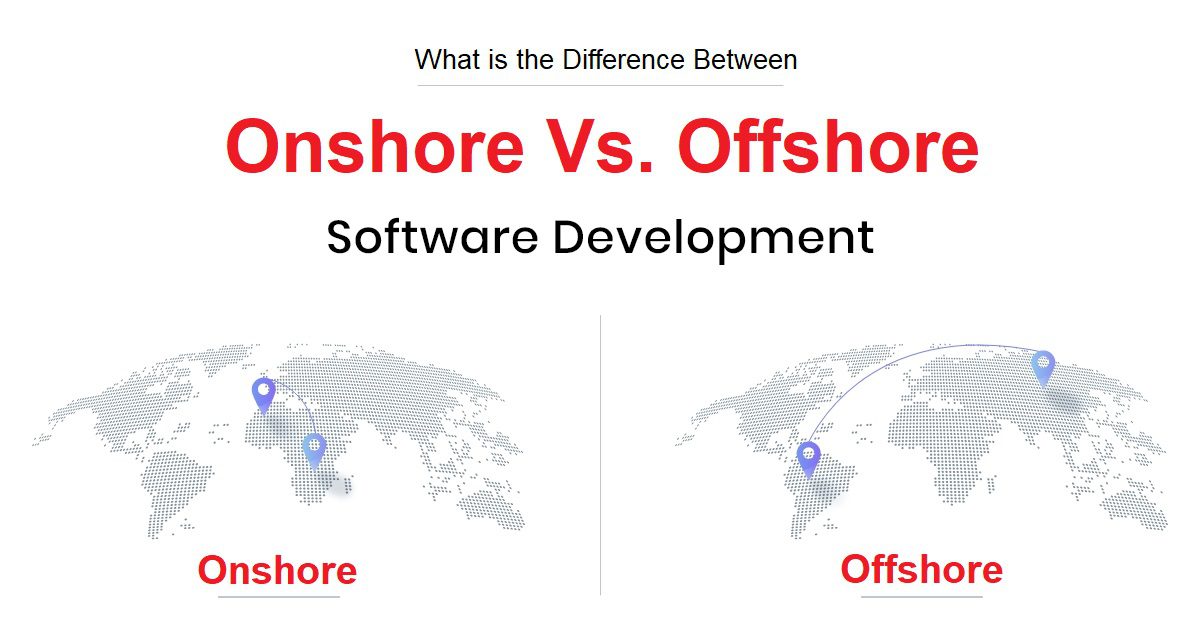Offshore Software Development: A Complete Guide in 2024

The offshore software development market is a valuable resource for companies looking to expand their technical teams or launch new projects. Global Offshore Software Development market size is estimated at USD 130556.0 Million in 2022 and will reach USD 244765.0 Million in 2028, with a CAGR of 11.04%.
We have put together a comprehensive guide to help you understand offshore software development. In this guide, we explain what offshore development entails, how it works, its advantages and Challenges, the countries that are commonly used for offshore software development, and the associated costs.
Are you wondering how to outsource software development to an offshore company? Here are some tips to get you started.
What is Offshore Software Development?
Businesses no longer need to employ staff on their premises to perform a diverse array of services. Today, they have the ability to access talent from various locations, including those outside their own country. The concept revolves around the idea that businesses can source high-quality work and specialized skill sets from around the globe. An example of this practice is offshore software development.
Offshore software development occurs when a company contracts out tasks to a partner located in a different time zone than the company’s headquarters. For instance, a Western European company collaborating with a software development team in South America or a U.S.-based organization partnering with a software development firm in Ukraine would be apt examples.
Offshore software development is often likened to the nearshore software development model. In this scenario, a business teams up with a software development group in a neighboring country to complete a software project. For example, a Western European company may cooperate with a development company in Ukraine, while a U.S. business might engage an outsourcing software development firm in South America.
In both instances, the approach entails working with a software developer or an entire team situated in a foreign country. It involves hiring an off-site and remote team to collaborate on various aspects of a software development project, including tasks such as fundamental coding, product design, custom software development, web, and mobile application creation, as well as software support and maintenance.
For most companies, engaging offshore development services is an excellent solution for projects that demand specialized expertise and high-quality outcomes that may be challenging to find on a local scale.
What is the Difference Between Offshore Software Development and Onshore Software Development?
The terms “offshore” and “onshore” have historically been employed to delineate two contrasting business models. When establishing a company, you are confronted with the decision of where to officially register it. Different regions feature distinct tax systems, labor laws, and privacy regulations, all of which significantly influence your company’s structural choices.
Onshore companies are registered in the country of their origin, where their founders and key personnel reside. They receive no special privileges concerning legal and tax matters and typically conduct the majority of their business within the region where they are registered. In many ways, this represents the conventional or default business model.
Conversely, offshore companies differ in that they are registered in a different country, often one where they do not engage in any business activities. This frequently leads to reduced tax obligations and enhanced privacy, though these benefits come with associated challenges. Ensuring full legal compliance demands a certain level of knowledge and expertise, and the penalties for non-compliance can be substantial.
In recent years, there has been a growing presence of mid-shore companies, which combine aspects of both onshore and offshore models, often choosing to register in countries such as Hong Kong or Singapore. These models may warrant consideration when registering a company, but their detailed exploration goes beyond the scope of this article. Now let’s discuss how offshore software development can benefit businesses.
Read also: Nearshore Software Development: what is it and how does It work?
Advantages of Offshore Software Development in 2023
There are several well-established advantages to offshore software development:
Cost Reduction
Outsourcing software development to offshore teams can significantly lower the expenses associated with hiring the right talent, particularly for many companies in North America and Western Europe. Most offshore software development firms are situated in countries with lower living costs and advantageous currency exchange rates, leading to substantial cost savings. Furthermore, outsourcing eliminates the need to cover recruitment expenses, employee benefits, and holiday pay.
Access to an Affordable Global Talent Pool
The Western hemisphere is currently facing a significant shortage of tech talent, exacerbated by economic challenges in the industry that restrict the budget for hiring local professionals. Offshore software development companies provide access to a global talent pool comprising dedicated professionals from countries that invest in cultivating technical expertise through educational programs.
Enhanced Scalability
The capability to swiftly adjust team size to meet customer demands is a critical success factor in the tech industry. Conventional hiring methods can impede this agility. However, collaborating with an offshore software development company allows businesses to promptly assemble a team of professionals already accustomed to working together, facilitating the immediate initiation of project work. Furthermore, disbanding the team after project completion is a straightforward process.
Focus on Core Competencies
By outsourcing a project or function to an offshore team, companies can concentrate on their core project competencies and take a more strategic approach. This shift liberates time for developing the product roadmap instead of becoming entangled in operational details.
Challenges of Offshore Software Development
While offshore development is a widespread practice among software companies, it does present certain challenges:
- Time Zone Differences: Collaborating with teams in different time zones may necessitate relying on asynchronous communication, which may require an adjustment period. However, once a solid rhythm is established, the process should feel more seamless.
- Cultural Influences: Different countries often have distinct working and communication styles, requiring adaptation based on the chosen outsourcing location for software development.
- Limited Control Over Hiring: Some offshore providers may seek to enhance their profit margin by hiring lower-cost engineers, potentially compromising the quality of their work. It is crucial to identify a provider that can be trusted.
Advantages of Hiring Offshore Developers in 2023
Nearly every company can reap the rewards of outsourcing development, as this approach boasts time-proven advantages, such as:
Access to Top-Tier Developers
The outsourcing route simplifies the process of finding a dependable development team with a diverse skill set encompassing design, development, and testing. It becomes more straightforward to locate proficient technical experts in your specific business domain and scale your operations accordingly.
Reduced Operating Costs
Collaborating with an offshore startup developer team eliminates the need to establish a physical workspace, manage day-to-day infrastructure, or provide equipment and IT systems. Moreover, substantial savings can be achieved in terms of both time and costs associated with the hiring process.
Lower Development Expenses
Many offshore development agencies offer competitive rates for their cutting-edge skill sets. For instance, in India, the cost of hiring a skilled developer typically falls within the range of $60 to $100 per hour.
Accelerated Project Delivery
Collaborating with multiple skilled developers can significantly reduce the time businesses spend on expediting in-house development. With a slightly higher investment, projects can be delivered to the market much more swiftly.
High Scalability
Development processes can be intricate, making it challenging to predict the necessary time and resources for product creation. Offshore software development companies simplify the scalability of the development team, expediting project delivery.
Access to Leading Technologies
Most offshore software companies specialize in cutting-edge technologies and skills that may be scarce among in-house developers. While it is feasible to hire an individual developer skilled in a specific technology, assembling an entire team with a diverse range of tech specializations can be demanding.
Reduced Development Risks
In-house software development necessitates taking responsibility for potential issues during the development and deployment phases. Conversely, partnering with an offshore custom software development company places the responsibility for product testing and glitch-free deployment squarely on their shoulders.
Focus on Core Activities
With a remote software team managing your custom offshore software development services, your primary focus can be directed toward core business activities.
Now that we’ve explored the myriad costs of offshore software development, let’s delve into which types of Regions stand to gain the most from this approach.
How Much Does it Cost to Hire the Best Offshore Software Development Team?
Several cost components come into play when hiring an offshore team. Here are the primary ones:
- Training and Recruitment
- Development
- Project Management
- Quality Assurance
- Ancillary Costs
- Service Costs
- Infrastructure Costs
An additional factor influencing the cost element is the geographical region of the company. Below are the average hourly rates of offshore software development companies worldwide.
|
Regions |
Average Hourly Rates (in US$) |
| North America | 80-100 |
| Western Europe | 50-180 |
| Latin America | 40-60 |
| Eastern Europe | 25-50 |
| Asia | 25-45 |
Keep a note of what can go wrong when you are considering how to partner with the best offshore development team.
Exploring the Optimal Offshore Software Development Locations
So far, we’ve delved into the fundamentals and the benefits that offshore software development brings to companies like yours.
In the upcoming section, we will explore the prime regions for outsourcing engineering teams, highlighting leading countries such as India and Colombia.
Asia
India stands out as the global leader in IT offshoring.
Tech hubs like Bangalore solidify this status, with 90,000 engineers graduating from the city’s universities annually, boasting a population of over one million software developers.
Thanks to the lower cost of living in comparison to Western countries, establishing offshore software development in India proves to be a cost-effective choice for businesses.
Another noteworthy Asian country for offshore development is The Philippines. This tropical archipelago ranks as the second most English-fluent region in Asia and 22nd globally.
However, The Philippines is grappling with a shortage of tech talent, affecting the overall quality of engineers in the Asia-Pacific region. While building an engineering team in the Philippines might be less expensive than in India, it may also involve hiring less qualified developers.
The average offshore software development rate in these locations is €25/h.
Eastern Europe
Offshoring to Eastern Europe presents a compelling opportunity for US and Western European companies.
This is especially advantageous for organizations requiring continuous, real-time collaboration with their offshore developers. The minimal time zone difference fosters better cooperation and diminishes communication gaps.
Countries like Poland and Ukraine are top choices if you seek developers with robust technical proficiency for short-duration projects.
Engineers in these regions typically charge €30/h on average.
Latin America
Latin America is emerging as an increasingly popular destination for offshoring development.
Countries such as Colombia, Mexico, and Argentina are investing in infrastructure and technology to attract international companies to invest in the region.
Cities like Medellin, Mexico City, and Buenos Aires are evolving into modern tech hubs with a talent pool of expert developers who share a strong cultural affinity with Western organizations.
One drawback of hiring Latin American offshore developers is the lower English language proficiency in some regions, which can pose challenges in gathering feedback and understanding project expectations.
On average, you can expect to pay €40/h for developers in Latin American countries.
How to Choose an Offshore Software Development Outsourcing Company?
When selecting a top software company, consider these key factors:
Effective Communication and Workflow
Efficient communication and seamless workflow are pivotal when outsourcing. Your software partner should demonstrate fluency in English or your preferred language, ensuring a smooth alignment of work processes throughout the development cycle.
Robust Security Measures
In our increasingly tech-driven world, cybersecurity is of paramount importance. Ensure that your chosen IT company maintains up-to-date security protocols to safeguard all data and software products, regardless of the software development model you opt for.
Exceptional Software Engineers
Offshore software development should grant you access to world-class tech talent. Choose an IT company that can provide top-tier software developers for a wide range of projects, spanning from product development to web development and routine IT services.
Proven Track Record
Always investigate references, previous clients, and completed projects of your prospective offshore software development partner. This information will offer insights into the IT company’s performance, workflow style, and the quality of their software products.
Comprehensive Service Portfolio
Your current needs may evolve over time. The best outsourcing companies are those that specialize in various fields and possess the necessary team size to handle your project with a holistic and highly experienced approach. Whether you require project management, product development, or other services, these offshore software development companies should be well-equipped to meet your needs.
Concluding Remarks
Undoubtedly, opting for external expertise in software development is a sound financial and business decision. While offshore software development may appear daunting, it becomes manageable with thorough planning and a clear understanding of the associated risks. Precisely outline your project, select the optimal offshore development partner, and implement best practices to maintain transparency, facilitate communication, and ensure project coordination.



